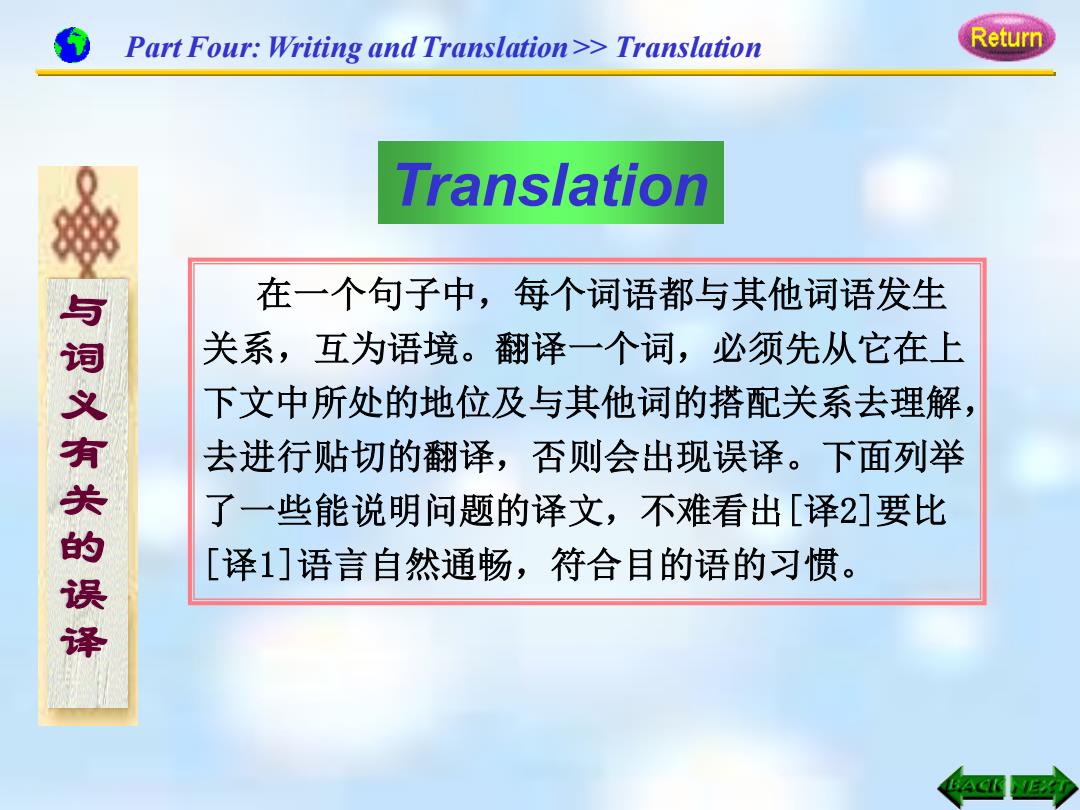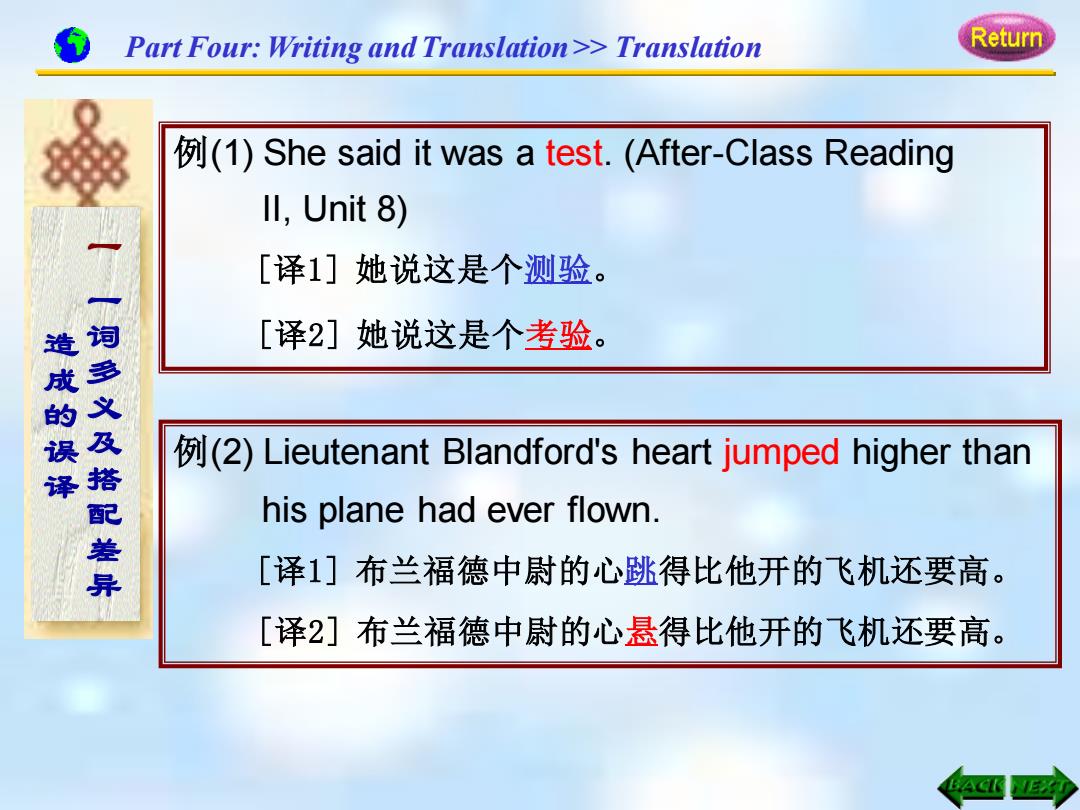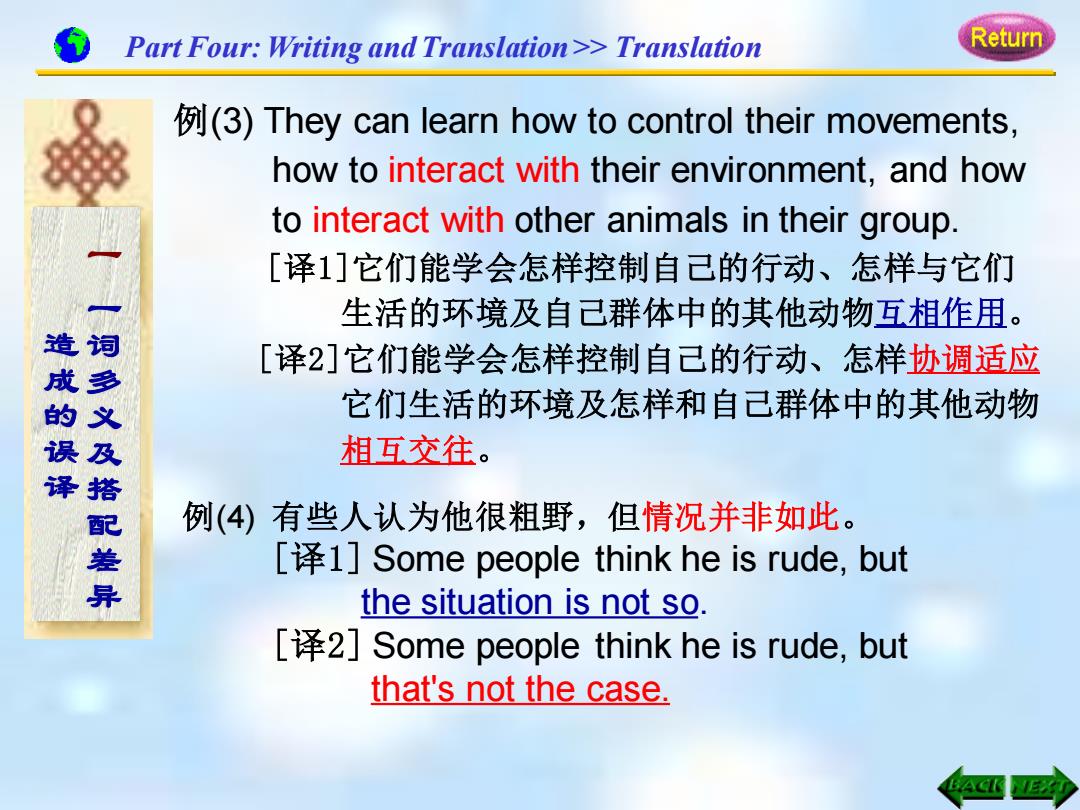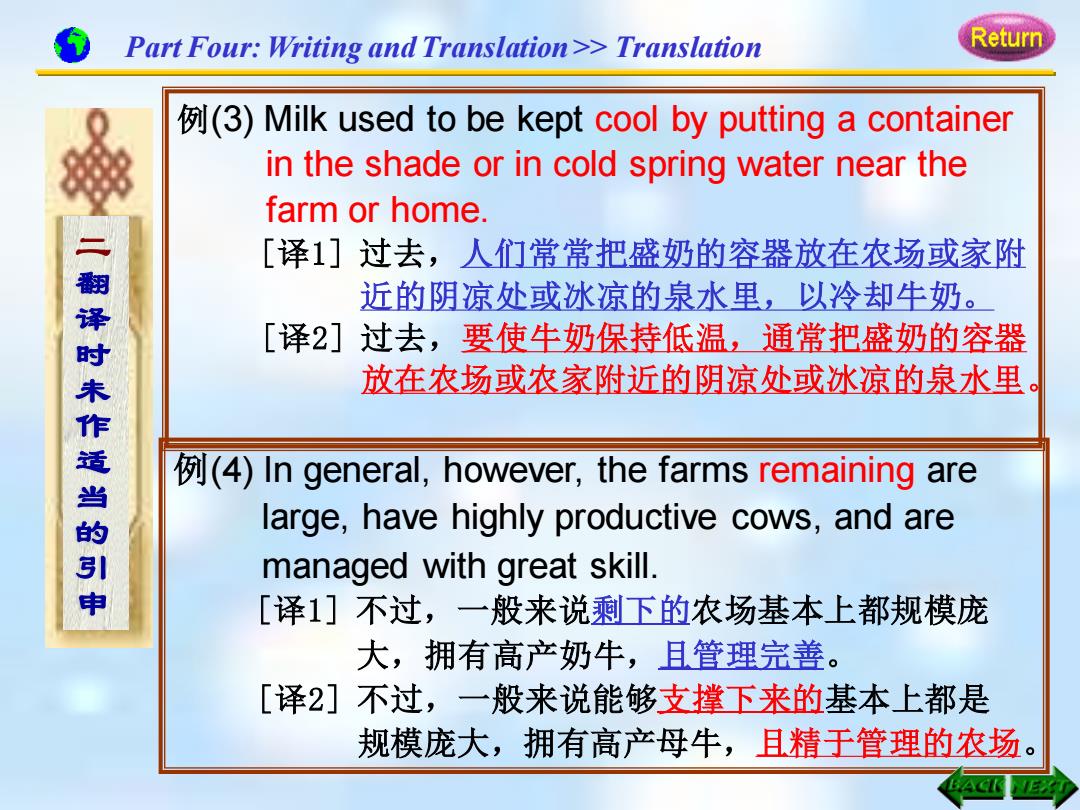
Part Four:Writing and Translation >Translation Return Translation 在一个句子中,每个词语都与其他词语发生 与词义有关的误译 关系,互为语境。翻译一个词,必须先从它在上 下文中所处的地位及与其他词的搭配关系去理解 去进行贴切的翻译,否则会出现误译。下面列举 了一些能说明问题的译文,不难看出[译2]要比 [译1]语言自然通畅,符合目的语的习惯
在一个句子中,每个词语都与其他词语发生 关系,互为语境。翻译一个词,必须先从它在上 下文中所处的地位及与其他词的搭配关系去理解, 去进行贴切的翻译,否则会出现误译。下面列举 了一些能说明问题的译文,不难看出[译2]要比 [译1]语言自然通畅,符合目的语的习惯。 与 词 义 有 关 的 误 译 Translation Part Four: Writing and Translation >> Translation

Part Four:Writing and Translation >Translation Return (1)She said it was a test.(After-Class Reading ll,Unit 8) [译1]她说这是个测验。 造成的课译 一词多义及搭配差异 [译2]她说这是个考验。 (2)Lieutenant Blandford's heart jumped higher than his plane had ever flown. [译1]布兰福德中尉的心跳得比他开的飞机还要高。 [译2]布兰福德中尉的心悬得比他开的飞机还要高
例(2) Lieutenant Blandford's heart jumped higher than his plane had ever flown. [译1] 布兰福德中尉的心跳得比他开的飞机还要高。 [译2] 布兰福德中尉的心悬得比他开的飞机还要高。 一 一 词 多 义 及 搭 配 差 异 造 成 的 误 译 例(1) She said it was a test. (After-Class Reading II, Unit 8) [译1] 她说这是个测验。 [译2] 她说这是个考验。 Part Four: Writing and Translation >> Translation

Part Four:Writing and Translation >Translation Return (3)They can learn how to control their movements, how to interact with their environment,and how to interact with other animals in their group. [译1]它们能学会怎样控制自己的行动、怎样与它们 生活的环境及自己群体中的其他动物互相作用。 [译2]它们能学会怎样控制自己的行动、怎样协调适应 它们生活的环境及怎样和自己群体中的其他动物 相互交往。 例(4) 有些人认为他很粗野,但情况并非如此。 [1]Some people think he is rude,but the situation is not so. [2]Some people think he is rude,but that's not the case
例(4) 有些人认为他很粗野,但情况并非如此。 [译1] Some people think he is rude, but the situation is not so. [译2] Some people think he is rude, but that's not the case. 一 一 词 多 义 及 搭 配 差 异 造 成 的 误 译 例(3) They can learn how to control their movements, how to interact with their environment, and how to interact with other animals in their group. [译1]它们能学会怎样控制自己的行动、怎样与它们 生活的环境及自己群体中的其他动物互相作用。 [译2]它们能学会怎样控制自己的行动、怎样协调适应 它们生活的环境及怎样和自己群体中的其他动物 相互交往。 Part Four: Writing and Translation >> Translation

Part Four:Writing and Translation>>Translation Return (1)If neighbors have changed,neighborhoods have not.They still have the same parts. [译1]如果邻居换了人,整个街坊不会变。 他们仍然有相同的部分。 [译2]如果邻居换了人,整个街坊不会变。 二翻译时未作适当的引申 街坊里该有什么还会有。 (2)The production of milk in many countries is now a large,scientifically based,highly mechanized industry. [译1]目前,在很多国家,生产牛奶已成为 大型的、基于科学的、高度机械化的产业。 [译2]目前,在很多国家,牛奶生产已成为 规模大、科学性强、高度机械化的产业
例(2) The production of milk in many countries is now a large, scientifically based, highly mechanized industry. [译1] 目前,在很多国家,生产牛奶已成为 大型的、基于科学的、高度机械化的产业。 [译2] 目前,在很多国家,牛奶生产已成为 规模大、科学性强、高度机械化的产业。 二 翻 译 时 未 作 适 当 的 引 申 例(1) If neighbors have changed, neighborhoods have not. They still have the same parts. [译1] 如果邻居换了人,整个街坊不会变。 他们仍然有相同的部分。 [译2] 如果邻居换了人,整个街坊不会变。 街坊里该有什么还会有。 Part Four: Writing and Translation >> Translation

Part Four:Writing and Translation >Translation Return (3)Milk used to be kept cool by putting a container in the shade or in cold spring water near the farm or home. [译1]过去,人们常當把盛奶的容器放在农场或家附 二翻译时未作适当的引申 近的阴凉处或冰凉的泉水里,以冷却生奶。 [译2]过去,要使生奶保持低温,通常把盛奶的容器 放在农场或农家附近的阴凉处或冰凉的泉水里 (4)In general,however,the farms remaining a are large,have highly productive cows,and are managed with great skill. [译1]不过,一般来说剩下的农场基本上都规模庞 大,拥有高产奶牛,且管理完善。 [译2]不过,一般来说能够支撑下来的基本上都是 规模庞大,拥有高产母牛,且精于管理的农场
例(4) In general, however, the farms remaining are large, have highly productive cows, and are managed with great skill. [译1] 不过,一般来说剩下的农场基本上都规模庞 大,拥有高产奶牛,且管理完善。 [译2] 不过,一般来说能够支撑下来的基本上都是 规模庞大,拥有高产母牛,且精于管理的农场。 二 翻 译 时 未 作 适 当 的 引 申 例(3) Milk used to be kept cool by putting a container in the shade or in cold spring water near the farm or home. [译1] 过去,人们常常把盛奶的容器放在农场或家附 近的阴凉处或冰凉的泉水里,以冷却牛奶。 [译2] 过去,要使牛奶保持低温,通常把盛奶的容器 放在农场或农家附近的阴凉处或冰凉的泉水里。 Part Four: Writing and Translation >> Translation